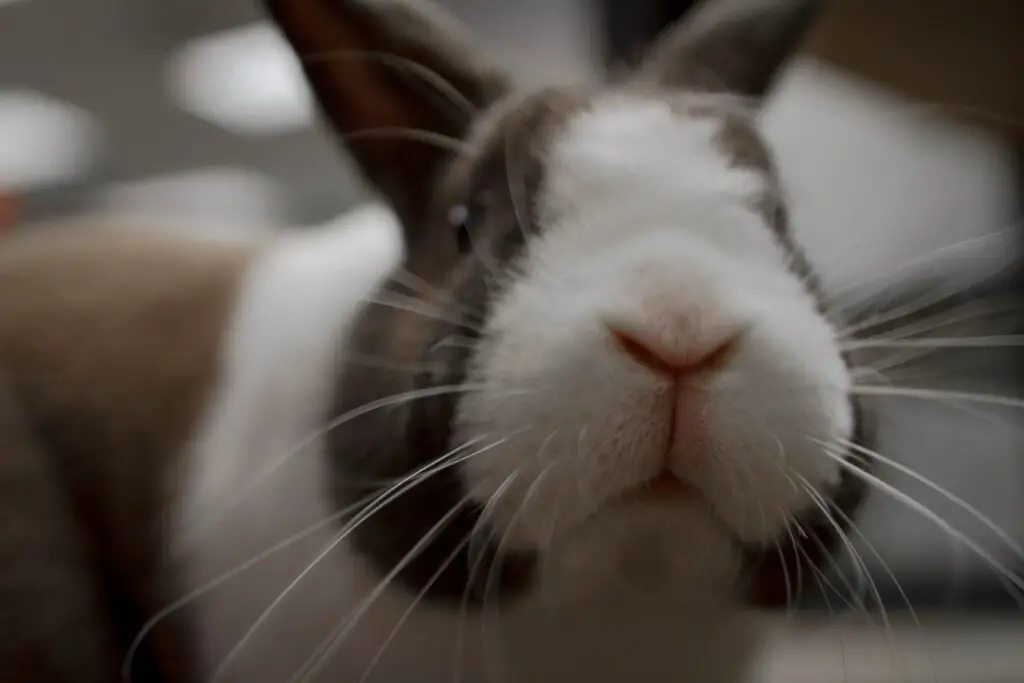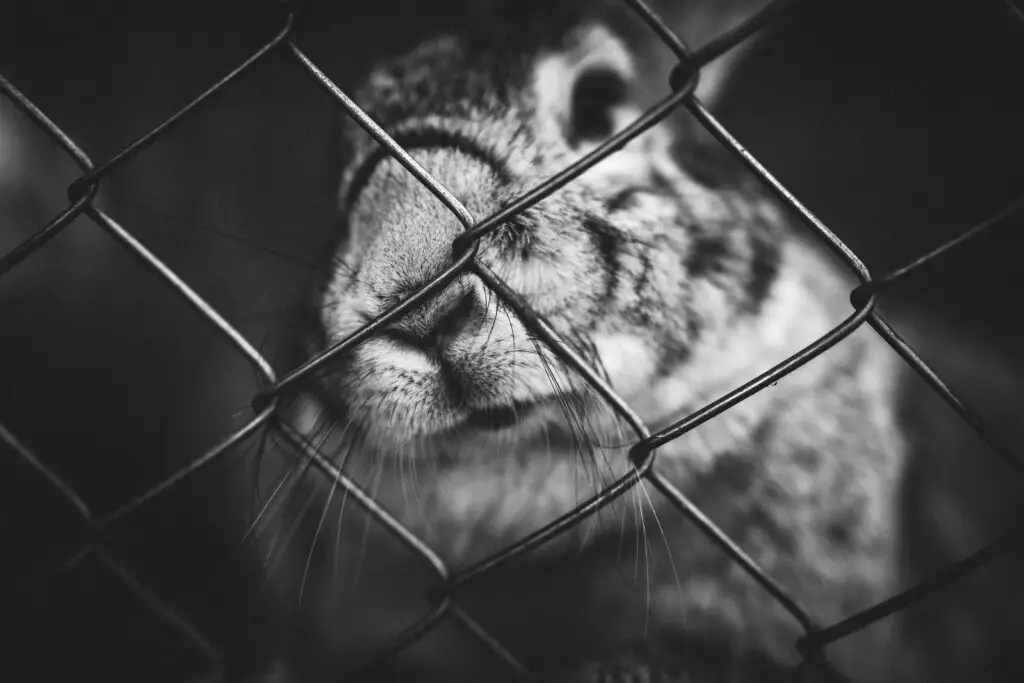Last Updated on June 12, 2023 by Leonard Harper
Rabbits are very good at hiding their discomfort and pain. This is due to their wild ancestors who had to be extra careful not to show any signs of weakness, as this would make them an easy target for predators.
This makes it even more important to be on the lookout for any changes in your rabbit’s behavior, as this could be an indicator that something is wrong.
Contents

How Does Rabbit Distress Call Sound Like
Did you know that rabbits also have a distress call? This high-pitched cry is usually only heard when a rabbit is in danger or feels threatened.
Luckily, animal recordings can help us to identify when a rabbit is in distress so that we can offer them the help they need.
Signs That Your Rabbit is in Distress
1. Tooth Grinding
Harsh and loud teeth grinding is called Bruxism. The sound is harsh and can be unsettling, but it’s a natural way for rabbits to cope with stress.
When they’re feeling anxious or threatened, rabbits will often grind their teeth as a way to release tension. This is known as a common behavior for self-soothing.
Loud tooth grinding can also be a sign of pain. Therefore, it is important that they be taken to a vet.
If your pet is not in pain, stress can be alleviated by providing more hiding places, toys, and opportunities to exercise. In some cases, medication may also be necessary.
2. Hostility and Sudden Aggression
Be aware of any unforeseen manifestations of hostility, as they may be signs of a rabbit in distress. Rabbits are generally docile but they can show signs of aggression when they feel scared or threatened.
The next time you see an angry bunny, take a step back and try to understand what might be upsetting it. With a little care and understanding, you can turn any tense situation into a relaxing one.
3. Changes in Breathing
One way to tell if your rabbit is stressed is by observing its breathing. If your rabbit is panting or its breathing is otherwise fast and shallow, this is a sign that it is feeling anxious or frightened.
Additionally, if your rabbit seems listless or lethargic, this can also be an indicator of stress. If you notice any of these signs, it’s important to take steps to calm your rabbit and help reduce its stress level.
Changes in breathing can also be a sign of respiratory infections. Therefore be vigilant that your bunny’s nose is not runny, bleeding, or excreting any abnormal discharge.
4. Changes in Appetite
See how much food your rabbit is eating. A change in appetite is a sign of stress or illness in rabbits.
A sick or stressed rabbit will often forego eating or eat less than they used to. You can try different foods to see if your rabbit likes them but always offer hay
If you notice that your bunny is losing weight, take them to a vet fast.
5. Rabbit Shrieking
Mark any piercing shriek that originates from your rabbit. Only rabbits that are in pain scream, so if you hear this type of noise coming from your bunny, pay close attention.
Marking the occasion will help you keep track of how often it happens and may give you clues as to what is causing the pain.
If the screams become more frequent, or if they are accompanied by other signs of distress, such as lethargy or loss of appetite, contact your veterinarian immediately.
In the meantime, do your best to provide your rabbit with a calm and comfortable environment. quiet music or a gentle petting may help to ease their pain and prevent further screaming episodes.

Common Physical Symptoms for Bunnies in Distress
The following are also other physical signs of a distressed rabbit.
1. Frailty in Your Rabbit’s Legs
When you look for physical signs of a distressed rabbit, one of the first places to check is the legs. Look for frailty in one of the legs, as this can be an indication that the rabbit is not getting enough exercise or that it is in pain.
If you see this, take your rabbit to the vet for an examination. Other signs of a distressed rabbit include lethargy, loss of appetite, and changes in behavior.
If you notice any of these signs, it’s important to take your rabbit to the vet as soon as possible. Don’t wait until the problem gets worse – by then, it may be too late to help your rabbit.
2. Bruises or Bleeding
Observe your rabbit closely for any open bruises or bleeding. It’s important to be aware that they can easily bruise or bleed, even if they don’t seem injured. This is because their skin is very thin and delicate. If you see any, it’s important to take your rabbit to the vet right away even if they try to hide it.
It’s also important to check for any other injuries such as broken bones. Checking for these injuries yourself can be difficult, so it’s always best to err on the side of caution.
3. Belly Bulging Or Enlargement
As any rabbit owner knows, these furry little creatures are prone to gastrointestinal (GI) problems. One of the most common is GI stasis, which occurs when the digestive system slows or stops functioning.
This can be caused by a blockage, an infection, or simply stress. Watch your rabbit’s belly for bulge or enlargement, as this is a sign of GI stasis.
If you see any signs of GI stasis, take your rabbit to the vet immediately. This condition is very painful for rabbits and can be fatal if not treated promptly.
4. Your Rabbit’s Ears Appear Strange
Rabbits’ little ears are one of the most expressive parts of your rabbit’s anatomy. They can convey a wide range of emotions, from curiosity and interest to fear, aggression and stress?
It is important to monitor your rabbit’s ears for any signs of ailment. Here are a few things to look for:
If your rabbit’s ears feel cold to the touch, it could be a sign that they are in pain or not feeling well. On the other hand, hot ears can indicate fever or heat stress.
If you notice either of these signs, it’s important to take your rabbit to the vet for a check-up.
5. Your Rabbit is Over-Grooming
If you notice that your rabbit is over-grooming, it could be a sign of stress. Be aware of assuming your rabbit brushes, licks, or grazes at a distinct section of its body more than usual.
Observe your bunny’s grooming habits as a whole. An increase in any of these behaviors could indicate stress. Over-grooming can lead to hair loss and bald spots, and in extreme cases can cause self-inflicted wounds.
If you think your rabbit is over-grooming, take them to the vet to rule out any underlying medical causes and to get advice on how to help reduce their stress levels.
In the meantime, try to provide them with plenty of enrichment opportunities and spend some extra time bonding.
When to Administer Pain Killers to a Rabbit?
When your rabbit is in pain, the first thing you want to do is give them some relief. However, it’s important to not administer pain killers without a vet’s signoff.
Over-the-counter drugs like ibuprofen and aspirin can be harmful to rabbits, even in small doses. If your rabbit is in pain, the best thing you can do is bring them to the vet for an evaluation.
The vet will be able to prescribe the appropriate medication and dosage for your rabbit’s specific condition. In the meantime, you can help your rabbit feel more comfortable by providing them with soft bedding material and keeping them quiet and warm.
By following these simple guidelines, you can help soothe your rabbit and not add to the risk of doing any further damage.
Conclusion
So if you think your rabbit might be in pain, don’t wait to take her to the vet. And remember, rabbits are unique individuals just like us, so they might show their distress in different ways. But one thing is for sure – they will all do so subtly.
By getting to know your bunny and being observant of their behavior, you can become attuned to when something is wrong and get them the help they need before it’s too late.
Leo, a novice urban farmer and avid writer hailing from Chicago, Illinois, finds his joy and inspiration in the company of rabbits. His affection for these cuddly creatures started when he was gifted a Mini Rex, named Poe, on his 18th birthday. Poe soon became a source of comfort, companionship, and surprisingly, creative inspiration. He soon expanded his brood to include three more rabbits of different breeds, each with their own engaging tale.
